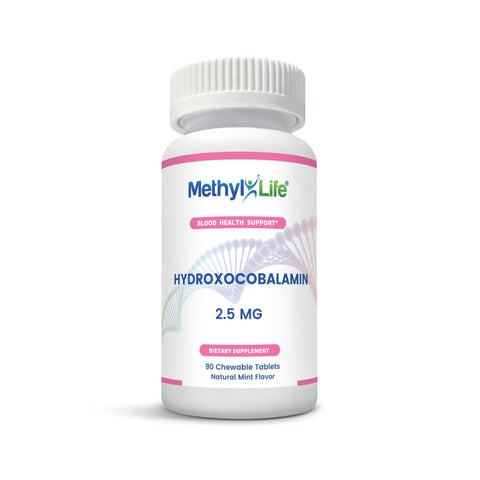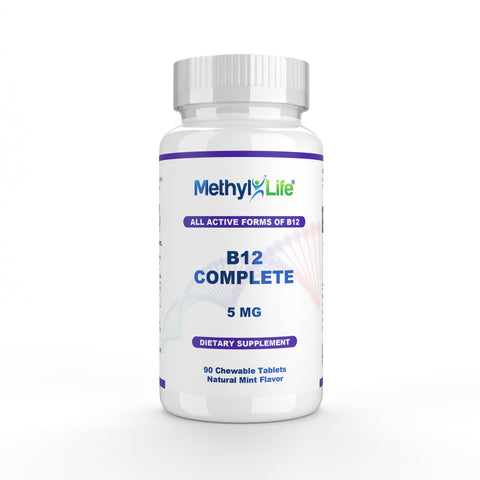
What's the Right Vitamin B12 Dosage for Older Adults?
Product Recommendations
Hydroxy B12
$29.00
- Supports Healthy Red Blood Cells & Myelin
- Promotes Healthy Brain Function & Detoxification
- 3rd-Party Tested for Purity, Potency & Safety
- 90 Vegan, Non-GMO, Chewable Mint Tablets
Product Recommendations
B12 Complete 5 mg
$32.00
- All 3 Bioactive Forms of B12 for Full-Spectrum Absorption
- Methylcobalamin B12, Hydroxy B12 & Adenosylcobalamin
- 3rd-Party Tested for Purity, Potency & Safety
- 90 Vegan, Non-GMO, Chewable Mint Tablets

Written By:
Katie Stone - Naturopath
Medical Reviewer:
Dr. Nare Simonyan - PhD Pharmaceutical Science
Edited By:
Kari Asadorian - BSN, RNUpdated On:
June 03, 2025The Risks of Vitamin B12 Deficiency as You Get Older
Between 10-30 percent of people over 502 produce too little stomach acid, often due to atrophic gastritis and reduced secretion of pepsin by the gastric mucosa. This reduces the ability to absorb B12 from food. Low acid may also cause bacterial overgrowth3 of the stomach and small intestine. These bacteria may then bind to vitamin B12 for their own use.
Pernicious anemia is also more prevalent4 in older age groups and reduces intrinsic factor required for B12 absorption. Disorders and surgery to the gastrointestinal system may also reduce absorption.
A B12 deficiency can have severe health implications for older people. If untreated, the nervous system can suffer progressive damage, especially the nerves outside the brain and spinal cord.
Hematological changes5 may include:
- Pancytopenia(reduced red and white blood cells and platelets)
- Macrocytosis(enlarged red blood cells)
- Hypersegmentation of neutrophils (a sign of megaloblastic anaemia)
- Hypercellular bone marrow (abnormally high numbers of cells)
Older adults with B12 deficiency are also at higher risk of cardiovascular diseases6 such as atherosclerosis and thrombotic events. This is due to elevated homocysteine resulting from inadequate B12 in the homocysteine-methionine conversion process.
Neuropsychiatric manifestations7 resulting fromB12 deficiency may include paraesthesia, weakness, gait abnormalities, and cognitive or behavioral changes. It has been shown that low serum vitamin B12is associated with a higher risk of cognitive impairment.8 Low B12is also significantly higher in people with Alzheimer’s disease.9
Older adults may also suffer10 irreversible loss of neurological function. Severe symptoms due to nerve damage may last for months or years and may be permanent. Loss of mental function caused by vitaminB12 deficiency is unlikely to return after treatment.11
How Do You Identify a Vitamin B12 Deficiency?
Many of the initial symptoms of vitamin B12deficiency are associated with anemia. These include fatigue, lightheadedness, muscle weakness, pallor, shortness of breath, and difficulty hearing and walking.
Damage to the spinal cord can lead to loss of sensation and/or ataxia (loss of muscle coordination). Other signs12 of B12 deficiency may include weight loss, poor reflexes, mild depression and confusion, hallucinations, and changes in personality and mood.
At present, there is no consensus or guideline for diagnosing B12 deficiency. Diagnosis is often based on clinical symptoms, low B12 test results, and elevated homocysteine or methylmalonic acid. A patient's response to treatment can also contribute to a diagnosis.
Treating a Vitamin B12 Deficiency
Treatment of vitamin B12 deficiency or pernicious anemia consists of high doses of vitamin B12 supplements. Regular blood tests are then required to ensure B12 level returns to normal.
People with severely low B12 levels or neurological symptoms will usually be treated with B12 intramuscular injections. These may be self-administered and are given daily or weekly for several weeks until the vitamin B12 level returns to normal. Injections are then given once a month or until the cause of the deficiency can be corrected.
Foods
B12 is created by bacteria that colonize the gut, which means its natural form is only present in animal products such as milk, cheese, eggs, and organ meats.
- Organ meats: liver, kidney, heart
- Shellfish: clams
- Meat: beef, pork, poultry
- Fish: trout, salmon, tuna
- Dairy products: unsweetened yogurt, milk,cheese
- Eggs
- Fortified cereals, bread
Food sources are unlikely to restore a deficiency due to the inability to absorb food-bound B12. The bioavailability of vitaminB12 from food also varies by the type of food source and by an individual’s capacity of intrinsic factor.
Supplements
Because a large proportion (up to 30%) of adults aged 50+ have a higher risk of malabsorption due to gastrointestinal disorders and/or poor stomach acid, it is recommended13 that they meet the RDA (Recommended Dietary Allowance) for vitamin B12 with supplements. B12 is reported to be about 50% more bioavailable14 in dietary supplements than in food sources.
Successful treatment and management of a deficiency may require lifelong oral supplementation or periodic intramuscular injections.
Cyanocobalamin is most often used in B12supplements, and high doses (1mg) are required15 because the lack of intrinsic factor requires absorption by passive diffusion from the gut.
However, the three naturally-occurring forms ofB12 (Methylcobalamin, Hydroxocobalamin, and Adenosylcobalamin) are shown to improve vitamin B12 status more effectively in lower doses than cyanocobalamin.16
A meta-analysis found that supplementing with oral B12 in 2000 mcg doses daily and 1000 mcg doses initially daily and then weekly/monthly may be as effective as intramuscular administration17 in providing short-term hematological and neurological benefits in patients with B12 deficiency.
Key Takeaways
Those aged 50+ should be aware of their higher risk of developing B12 deficiency and the implications for their long-term health. The recommended intake of 2.4mg may not be sufficient to maintain healthy levels of this crucial nutrient.
Vitamin B12 deficiency can have serious and potentially irreversible consequences, particularly in terms of neurological function. Although it is advisable to focus on eating plenty of B12-rich foods, malabsorption issues mean that food alone may not be enough to restore and maintain adequate levels.
Severe deficiency will require intramuscular injections to correct anemia and/or prevent neurological complications. However, oral supplementation with active forms of B12 may also be highly effective in restoring B12 levels.

Product Recommendations
Vitamin B12 Tablets (Sublingual B12 as Bioavailable Hydroxy) – Supports Brain & Red Blood Cells
$29.00
- Supports Healthy Red Blood Cells & Myelin
- Promotes Healthy Brain Function & Detoxification
- 3rd-Party Tested for Purity, Potency & Safety
- 90 Vegan, Non-GMO, Chewable Mint Tablets
Product Recommendations
Vitamin B12 5000 mcg (Methylcobalamin B12 Complete) – 3 Bioactive Forms
$32.00
- All 3 Bioactive Forms of B12 for Full-Spectrum Absorption
- Methylcobalamin B12, Hydroxy B12 & Adenosylcobalamin
- 3rd-Party Tested for Purity, Potency & Safety
- 90 Vegan, Non-GMO, Chewable Mint Tablets
References
-
H.W. Baik, R.M. Russell; "VITAMIN B12 DEFICIENCY IN THE ELDERLY"; Annual Review of Nutrition Vol. 19; 1999
https://www.annualreviews.org/doi/10.1146/annurev.nutr.19.1.357
-
S D Krasinski, R M Russell, I M Samloff, R A Jacob, G E Dallal, R B McGandy, S C Hartz; "Fundic atrophic gastritis in an elderly population. Effect on hemoglobin and several serum nutritional indicators"; Journal of the American Geriatrics Society; 1986 Nov
https://pubmed.ncbi.nlm.nih.gov/3771980/
-
H.W. Baik, R.M. Russell; "VITAMIN B12 DEFICIENCY IN THE ELDERLY"; Annual Review of Nutrition Vol. 19; 1999
https://www.annualreviews.org/doi/10.1146/annurev.nutr.19.1.357
-
CW Wong; "Vitamin B12 deficiency in the elderly: is it worth screening?"; Hong Kong Medical Journal; 2015 Apr
https://www.hkmj.org/abstracts/v21n2/155.htm
-
Manojna Konda, Abhijit Godbole, Soumya Pandey, Appalanaidu Sasapu; "Vitamin B12 deficiency mimicking acute leukemia"; Baylor University Medical Center Proceedings; 2019 Apr
https://www.tandfonline.com/doi/full/10.1080/08998280.2019.1641045
-
CW Wong; "Vitamin B12 deficiency in the elderly: is it worth screening?"; Hong Kong Medical Journal; 2015 Apr
https://www.hkmj.org/abstracts/v21n2/155.htm
-
John Lindenbaum, Edward B. Healton, David G. Savage, John C.M. Brust, Thomas J. Garrett, Elaine R. Podell, Paul D. Margell, Sally P. Stabler, Robert H. Allen; "Neuropsychiatric Disorders Caused by Cobalamin Deficiency in the Absence of Anemia or Macrocytosis";
https://www.nejm.org/doi/full/10.1056/NEJM198806303182604
-
Shazia Jatoi, Abdul Hafeez, Syeda Urooj Riaz, Aijaz Ali, Muhammad Ishaq Ghauri, Maham Zehra; "Low Vitamin B12 Levels: An Underestimated Cause Of Minimal Cognitive Impairment And Dementia"; Cureus; 2020 Feb
https://www.ncbi.nlm.nih.gov/pmc/articles/PMC7077099/
-
H Refsum, A D Smith; "Low vitamin B-12 status in confirmed Alzheimer’s disease as revealed by serum holotranscobalamin"; BMJ Journals | Journal of Neurology, Neurosurgery & Psychiatry; 2003
https://jnnp.bmj.com/content/74/7/959
-
Patrick J Stover; "Vitamin B12 and older adults"; Current opinion in clinical nutrition and metabolic care; 2016 Nov
https://www.ncbi.nlm.nih.gov/pmc/articles/PMC5130103/
-
Larry E. Johnson; "Vitamin B12 Deficiency"; MSD Manual, Consumer Version; 2024 Aug
https://www.msdmanuals.com/en-nz/home/disorders-of-nutrition/vitamins/vitamin-b12-deficiency#v45106312
-
Larry E. Johnson; "Vitamin B12 Deficiency"; MSD Manual, Consumer Version; 2024 Aug
https://www.msdmanuals.com/en-nz/home/disorders-of-nutrition/vitamins/vitamin-b12-deficiency
-
Patrick J Stover; "Vitamin B12 and older adults"; Current opinion in clinical nutrition and metabolic care; 2016 Nov
https://www.ncbi.nlm.nih.gov/pmc/articles/PMC5130103/
-
National Institutes of Health (NIH) Office of Dietary Supplements (ODS); "Vitamin B12"; 2024 Mar
https://ods.od.nih.gov/factsheets/VitaminB12-HealthProfessional/
-
Patrick J Stover; "Vitamin B12 and older adults"; Current opinion in clinical nutrition and metabolic care; 2016 Nov
https://www.ncbi.nlm.nih.gov/pmc/articles/PMC5130103/
-
Cristiana Paul, David M Brady; "Comparative Bioavailability and Utilization of Particular Forms of B12 Supplements With Potential to Mitigate B12-related Genetic Polymorphisms"; Integrative medicine; 2017 Feb
https://www.ncbi.nlm.nih.gov/pmc/articles/PMC5312744/
-
Josep Vidal-Alaball, Christopher Butler, Rebecca Cannings-John, Andrew Goringe, Kerry Hood, Andrew McCaddon, Ian McDowell, Alexandra Papaioannou; "Oral vitamin B12 versus intramuscular vitamin B12 for vitamin B12 deficiency"; The Cochrane database of systematic reviews; 2016 Nov
https://www.ncbi.nlm.nih.gov/pmc/articles/PMC5112015/

About the Author
Katie is a qualified Naturopath (BNatMed) and freelance writer from New Zealand. She specializes in all things health and wellness, particularly dietary supplements and nutrition. Katie is also a dedicated runner and has completed more half-marathons than she can count!
Related Articles

What is the Best Form of B12 for You?
Written By: Jamie Hope - Methyl-Life® Founder

Like what you read?
Please subscribe to get more content like this sent to your inbox.
Share This Article
Trusted by Experts. Backed by Science.
Trusted professionals crafting original content backed by verified research. Since 2012, Methyl-Life® has been dedicated to providing evidence-based education to help individuals better understand methylation and nutritional wellness.
-

Expert-authored education
Every article and guide is written or reviewed by professionals specializing in methylation science and nutritional biochemistry.
-

Research-verified information
Our content references peer-reviewed studies and verified data, ensuring accuracy, integrity, and real-world relevance.
-

Educational leadership since 2012
A founder-led team collaborating with clinicians, researchers, and health writers to make complex science accessible and actionable.
-

Transparent and trustworthy
All educational materials undergo internal review for scientific accuracy, compliance, and clarity before publication.
Blog Categories
Table of Contents
Product Recommendations
Vitamin B12 Tablets (Sublingual B12 as Bioavailable Hydroxy) – Supports Brain & Red Blood Cells
$29.00
Vitamin B12 5000 mcg (Methylcobalamin B12 Complete) – 3 Bioactive Forms
$32.00








